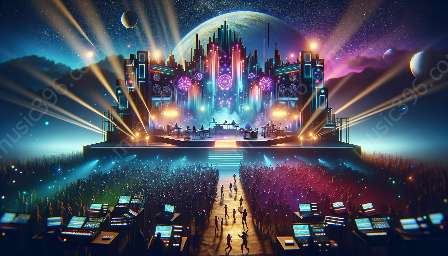Electronic music has become synonymous with immersive and interactive audio-visual experiences, revolutionizing pop culture and influencing modern society. Through its unique blend of technological innovation and creative expression, electronic music has reshaped the way we perceive and experience music, visual arts, and entertainment.
The Evolution of Electronic Music
Electronic music emerged in the mid-20th century as a result of advancements in technology and the desire to create new sounds and musical experiences. Pioneering electronic musicians such as Karlheinz Stockhausen, Wendy Carlos, and Kraftwerk laid the groundwork for the genre, utilizing synthesizers, drum machines, and computer technology to produce innovative and experimental compositions.
As electronic music continued to evolve, subgenres such as techno, house, trance, dubstep, and EDM (electronic dance music) emerged, each contributing its own unique style and approach to sonic exploration. These subgenres not only expanded the sonic palette of electronic music but also created a vibrant and dynamic culture surrounding the genre, with dedicated fan bases and immersive live events.
Immersive and Interactive Audio-Visual Experiences
Electronic music has played a pivotal role in the creation of immersive and interactive audio-visual experiences, blurring the boundaries between sound and visual art. Through the integration of visual projections, lighting effects, and interactive technologies, electronic music events and festivals have transformed into multisensory journeys, captivating audiences and providing a fully immersive experience.
Artists and visual designers collaborate to synchronize visuals with music, creating mesmerizing displays that enhance the emotional impact of the music and transport audiences to otherworldly realms. The utilization of cutting-edge technologies, such as 3D mapping, LED screens, and virtual reality, has further expanded the possibilities for creating immersive audio-visual experiences, pushing the boundaries of creative expression and audience engagement.
The Role of Electronic Music in Pop Culture
Electronic music has significantly influenced pop culture, shaping trends in fashion, art, and lifestyle. Its pulsating beats, infectious rhythms, and otherworldly sounds have permeated mainstream media, influencing advertising, film soundtracks, and video game scores. The distinctive visual aesthetics associated with electronic music, including neon lighting, futuristic imagery, and abstract visuals, have become iconic symbols of modern pop culture.
Moreover, the global reach of electronic music has transcended cultural boundaries, fostering a sense of unity and diversity through shared experiences and collective euphoria. Festivals such as Tomorrowland, Ultra Music Festival, and Electric Daisy Carnival have become cultural phenomena, attracting diverse audiences from around the world and serving as epicenters of electronic music culture.
The Impact on Modern Society and the Music Industry
Electronic music's influence extends beyond entertainment, leaving a lasting impact on modern society and the music industry. Its experimental and boundary-pushing nature has inspired innovation in technology, leading to advancements in sound production, live performance capabilities, and audio-visual technologies.
The rise of electronic music streaming platforms and digital music production tools has democratized music creation, allowing aspiring artists to create and distribute their work with unprecedented ease. The influence of electronic music has also reshaped the music industry's landscape, from the rise of independent labels and DIY culture to the integration of electronic elements in mainstream pop music.
Conclusion
The role of electronic music in the creation of immersive and interactive audio-visual experiences is profound, shaping modern culture and redefining the way we experience music and visual art. Its influence on pop culture, modern society, and the music industry underscores the significance of electronic music as a powerful force of creative expression and innovation, transcending boundaries and captivating audiences worldwide.


